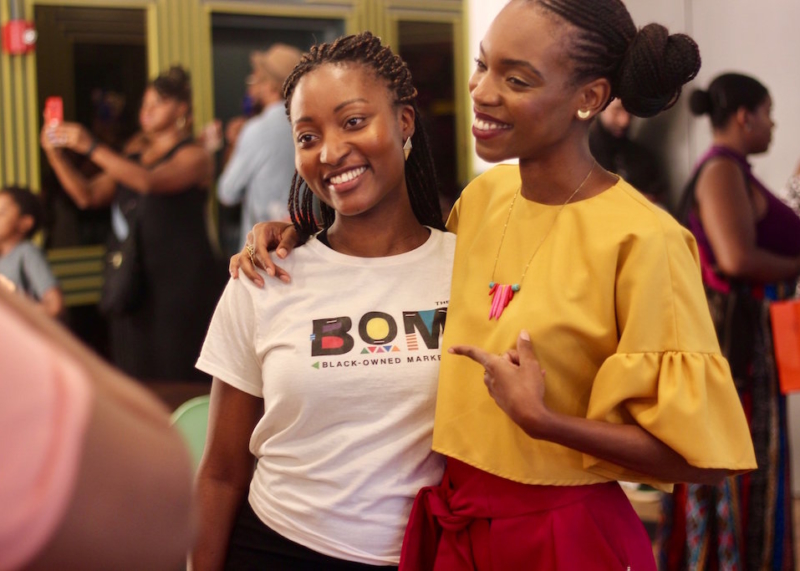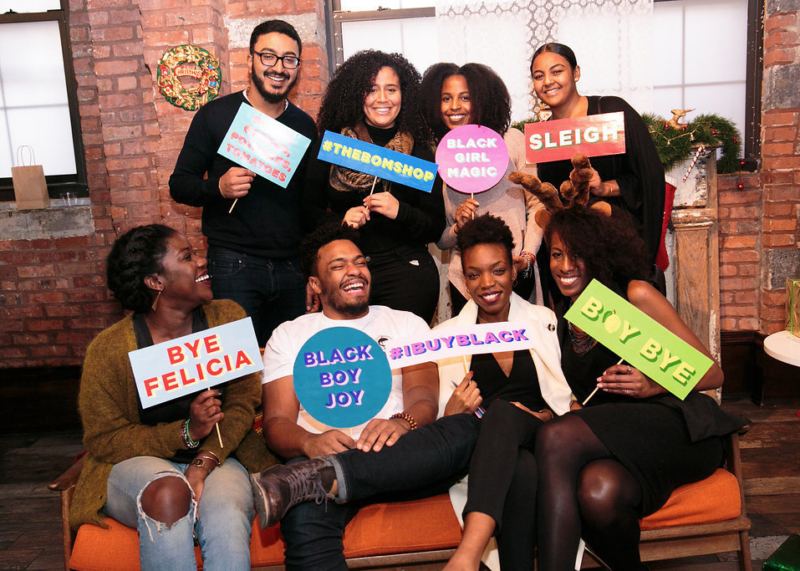Americans have spent an estimated $85 billion at independent stores and restaurants on the Saturday after Thanksgiving since 2010. Michelle Dalzon, the founder of the Black-Owned Market (theBOM)—a curated pop-up event—is hoping some of those spenders shop black.
“Black brands are often cast to the side until it’s something like Black History Month, but I want us to always be a part of the conversation,” she says. “These spaces I’m creating allow people that are unheard to showcase their brands, their voices, and why they started these companies.”
At the pop-up events, which have taken place roughly twice a year, a selection of entrepreneurs who sell almost exclusively online have a chance to interact directly with customers. Shoppers, who spend an average of $150 to $200 at the events, find jewelry and vintage clothing, cosmetics and skincare products, and luxury candles and other home goods.
Dalzon calls the pop-up events a “proof of concept” that shoppers will turn out to support black-owned businesses. She plans to create a more permanent shopping experience that will reach many more people. By the end of next year Shell’s Loft, a multipurpose event space in the Clinton Hill neighborhood of Brooklyn, will host a BOM store every other weekend.

According to Dalzon, there are still a lot of untruths about black-owned companies, including that the items they sell are too expensive, or that their product lines are too limited, or that the owners are unprofessional. “Usually it’s because of one experience that they might have had that’s negative, but I find that brands that are comparable that aren’t black get chance after chance,” she says.
Dalzon, who works from WeWork locations in New York and Boston, launched theBOM in December 2016 after spending years working in the corporate media world, doing marketing, sales, and social media at Essence, Turner Broadcasting, and Viacom.
But entrepreneurship was in her blood. Her parents, who had emigrated to the United States from Haiti in 1970, grew disenchanted with working for other people (“especially in a time when there was heightened racism and segregation,” Dalzon says). They started a beauty supply store not far from their home in Massachusetts in 1988—the same year she was born. “When people came into the store, they had not only not seen the concept, but they were intrigued that this black family had started this business,” she says.
Opening a black-owned business can be challenging, even in Dalzon’s adopted city of New York. According to a 2017 report, the number of black-owned businesses in the city declined from 2007 to 2012. The report cites skyrocketing rents in gentrifying neighborhoods as one of the leading causes. “The benefits of increased economic activity,” it concluded, “have not been broadly distributed among residents of those communities.”

Dalzon says many shoppers want to support black-owned businesses, but don’t know where to look. “I think it comes down not knowing where to go to find them,” she says. “That’s essentially why theBOM exists: to make it easier for you to find black-owned brands that you want to shop.”
That’s why Dalzon partnered with Black-Owned Brooklyn, a guide to brick-and-mortar businesses in the borough. The company launched on Instagram less than nine months ago and already has more than 18,000 followers.
Cofounders Cynthia Gordy Giwa and Glenn Alan say their “hyperlocal service journalism project” does more than just promote black-owned businesses. “We try to drive home that you don’t have to just be black to support black-owned businesses,” says Gordy Giwa.
After moving back in with her parents in Massachusetts earlier this year, Dalzon applied for a position at Follain, a natural beauty chain, on the sales floor. Working at a company with a similar philosophy as her own has helped her understand how to run a store—crucial expertise as theBOM enters its next phase.
When she talks with other entrepreneurs, she urges them not to put off following their dream.
“For so long, I was thinking about this idea and I gave myself an immediate deadline,” Dalzon says. “I would work 9 to 5, get home by 7, eat, and then work from like 7:30 until 1, 2 o’clock in the morning—and just do that all over again. I was a zombie for sure, but it was such a crucial time because I still had the money from my cushy corporate job to put into my startup. So just start.”







